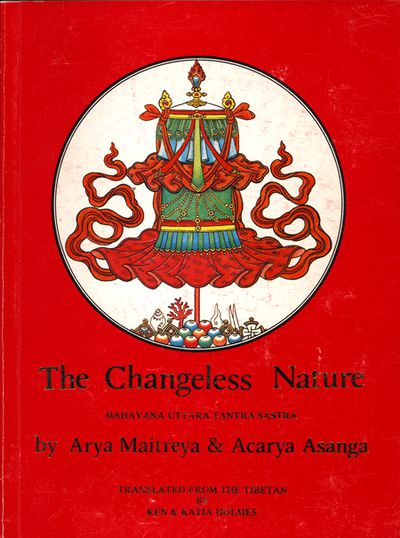Lord Buddha taught the dharma in three main phases of teaching called the three dharmachakras or the three 'turnings of the wheel of dharma'. The first dharmachakra expounded the 'Four Truths of the Realised', the 'Eightfold Path of the Realised' and other fundamental principles, thereby making clear what suffering is, what causes such suffering, what really constitutes a definitive end (cessation) to suffering and what the means are for achieving this definitive end. The teachings given in this first phase are the easiest to understand.
The second dharmachakra, also referred to as the 'middle turning' or the 'dharmachakra of no-characteristics', demonstrated the illusory nature of everything and placed the teachings of the first dharmachakra in a much less concrete perspective; suffering was no longer something to be doted with existential reality and the fundamental statements of voidness (śūnyatā) - 'form not existing', 'sound not existing' etc. - were postulated to show the void nature of everything. In the third dharmachakra the 'true nature' of everything was explained - not just voidness, in the sense of complete absence or
negation, but a void nature, resplendent with all qualities, naturally present, which is the essence of all beings; their buddha-nature. Since this is the very nature of all beings then by working on it anyone of them can reveal the enlightened wisdom that is inherent to that
nature.
The subject matter of these three dharmachakras was commented upon and cross-referenced in the many treatises (śāstra) composed by
buddhist scholars after the Buddha's parinirvāṇa. Maitreya composed five encyclopaedic śāstra of which this Mahāyāna Uttara Tantra Śāstra is one. Its teachings are those of the third dharmachakra. Many commentaries have been written for Maitreya's text, transmitted into
this world by Aćarya Asaṅga. and the one chosen for this translation's standpoint is that of Jamgön Kongtrül the Great, whose commentary is in two main parts: an introduction to Maitreya's work and a commentary on the actual text of the original. (Kenneth and Katia Holmes, translator's introduction, 3–4)
| Citation | Holmes, Ken, and Katia Holmes, trans. The Changeless Nature: The Mahāyānottaratantraśāstra. 2nd ed. By Arya Maitreya and Acarya Asanga. Eskdalemuir, Dumfriesshire, Scotland: Karma Kagyu Trust, 1985. https://archive.org/details/mahayanottaratantrasastrathechangelessnaturebykenandkatiaholmes_202003_994_R/page/n1/mode/2up. |
|---|---|


